After the revelations about the role of Cambridge Analytica in recent elections, one of the company's most touted tactics — psychometric profiling — has come under the spotlight. How are companies like Cambridge Analytica using psychological assessments combined with information about your digital behaviour to influence the democratic process? This piece explains how information about your personality has become a political asset and instrument.
What is psychometric profiling?
Psychometric profiling is the process by which your actions are used to infer your personality. The technique was developed by academics and used by marketers and advertisers to assess the psychological characteristics of an individual or a group. These profiles give advertisers and political strategists insights into users' beliefs, behaviours and motivations. By appealing to these underlying traits on an individual or group level, psychometrically-informed advertisements have the potential to be more persuasvie and are thus used to influence decisions like what to buy or how to vote. While other forms of personality-based profiling exist, we are focusing on psychometric profiling here because of its widespread coverage.
How does it work?
Advertisers and marketers use several methods to derive psychometric profiles: the easiest and most direct option is to conduct a survey that reveals aspects of the participants' psychological composition. The survey data is then analysed to create a psychometric profile of the individual or group. More recently, researchers have discovered that conducting a mass survey to infer these traits is unnecessary. Instead, these traits can simply be predicted from alternative sources like Facebook data. Using digital footprint data to predict psychological characteristics eliminates much of the cumbersome survey process and enables profiling to occur at scale, thus enabling large-scale inferences like those below.
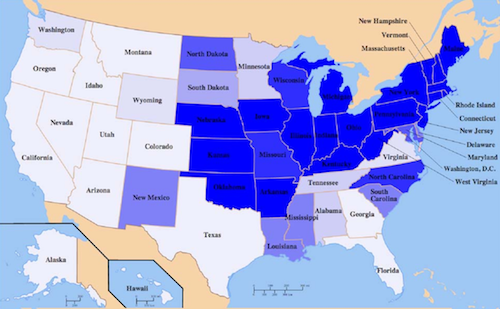
The OCEAN Model
The most common model used for psychometric profiling is the OCEAN model, also called the "Big Five" or the "Five Factor Model," named for the five main personality traits it measures: openness, conscientiousness, extraversion, agreeableness and neuroticism. The OCEAN model claims to reveal “the basic structure underlying the variations in human behaviour and preferences.” Psychologists believe that these five traits contain more information about an individual or population's motivations and decision-making processes than any other five traits. This is invaluable information for those targeting a specific audience with a particular advertisement or political message.

As the demand for psychometric profiling heats up among for-profit companies and political campaigns, a number of private companies in addition to Cambridge Analytica aim to capitalize on the moment. A host of startups including Affectiva, RealEyes, and Sensum are vying to capture the rewards of the psychologically-informed ad market. Established firms, too, have entered the mix. The market research company Nielsen acquired neuromarketing company Innerscope in 2015. Auto manufacturer Ford conducted experiments in Vietnam with mobile ads timed precisely at emotional moments of sporting events and observed boosts in retail sales that far exceeded their expectations.
Just as psychometric profiling can boost product sales with compelling advertising, it can also promote or demote political candidates and sway voters with curated political messages that are micro-targeted to individuals or groups.
How is your data used?
Unlike features like gender and age, psychometric characteristics are not directly observable, so they need to be inferred. Statistical models are used for this purpose. Cambridge University PhD Michal Kosinski, a pioneer in the field of psychometric profiling and digital behaviour, was the first to show that digital records could be used to ascertain sensitive traits about people, including information about their personality. Using relatively elementary statistical techniques, researchers can infer psychometric profiles at much larger scales and with more accuracy and efficiency than previously possible. These algorithms use input data (e.g. from Facebook) to output predictions of psychological composition. After his groundbreaking finding in 2013, Kosinski co-authored a paper in 2014 concluding that "pervasive records of digital footprints can be used to infer personality." In 2015, he demonstrated that simple algorithms can better predict a person's personality than his/her own friends, co-workers and partners.
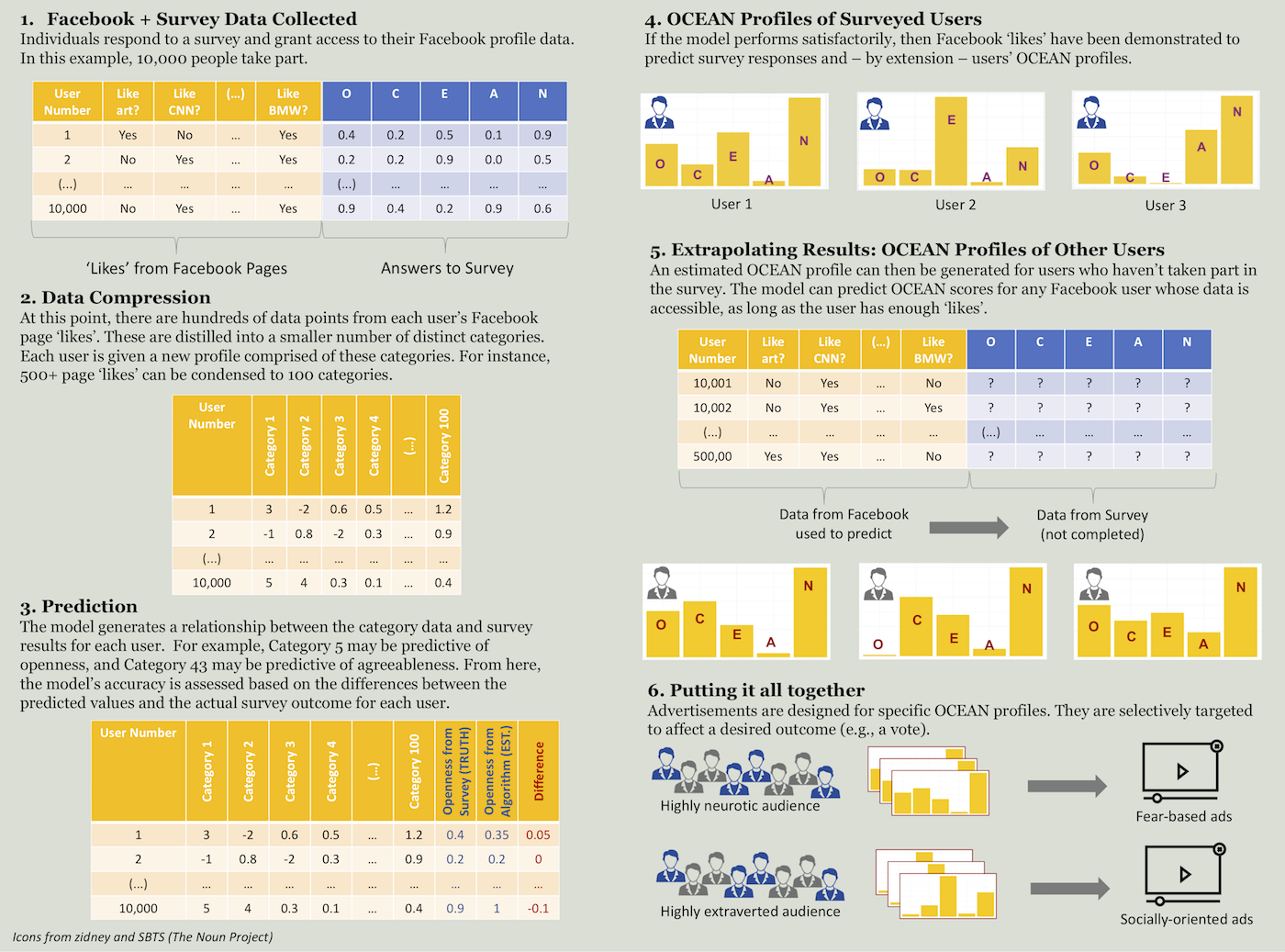
In 2017, Kosinski and a team of other business school professors extended the work of the Canadian team from 2012 by testing whether or not psychometrically-tailored ads performed better in the real world. Kosinski and his colleagues designed advertisements for actual brands, targeted them at their intended audiences, and measured the impact (e.g. real-world sales) relative to a control group. They described the significance of their results as follows:
"Building on recent advancements in the assessment of psychological traits from digital footprints, this paper demonstrates the effectiveness of psychological mass persuasion – that is, the adaptation of persuasive appeals to the psychological characteristics of large groups of individuals with the goal of influencing their behaviour."
In other words, they illustrated that adding psychological customisation to ads already tailored to topicality, framing, tone, medium, frequency and the standard suite of micro-targeting demographics (age, race, sex, location, education level, income, occupation, movie preferences, etc.) increases the chance of successfully altering a desired behaviour (here, sales). Before this publication, political strategists sought out psychometric tools with the hope of using personality-based insights to win elections.
Case Study: Experian
The consumer credit reporting agency Experian touts its psychometric capabilities to clients worldwide. The data broker holds data on over a billion people in Europe and the United States and earned over 4.6 billion USD in revenue in 2015. Among the many offerings of Experian Marketing Services is Audience IQ, a one-stop shop for marketers that apparently can "influence voting behavior by interweaving demographic, psychographic, and attitudinal" characteristics. Both the Conservative and Labour parties in the UK are Experian clients.
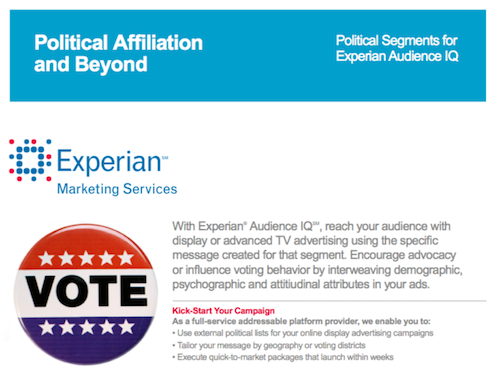
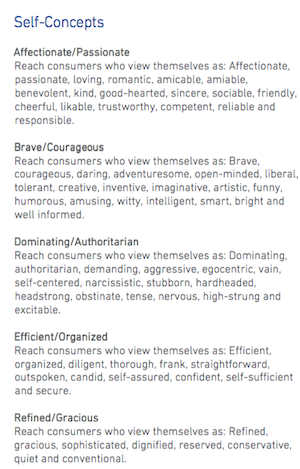
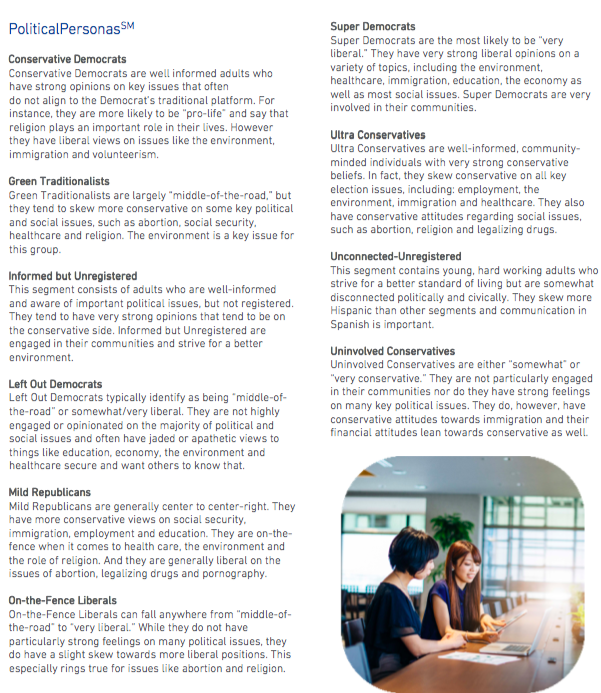
Case Study: Cambridge Analytica
Much has been reported about Cambridge Analytica and the way Alexander Nix, the company's former CEO, leveraged academic work on using personality-based insights to affect voters. As Nix himself describes in the following video: "It's personality that drives behaviour, and behaviour obviously influences how you vote."
Cambridge Analytica identified and targeted persuadable voters in the run-up to the 2016 US Presidential election, first for Ted Cruz, and then for Donald Trump's campaign. The company also serviced ten other candidates in the 2016 American elections. By harvesting psychological survey data, constructing algorithms to predict psychological traits, and extrapolating these results more widely, the company "was able to produce a model of the personality of every single person in the United States of America." This, in turn, allowed Cambridge Analytica to deliver micro-targeted ads to potential voters based on their profiles on hot-button issues like their feelings toward the Second Amendment.
Where is it being used?
Though Cambridge Analytica's psychometric profiling has reportedly been used in elections in the US, it's not clear if Strategic Communication Laboratories (SCL), Cambridge Analytica's parent company, employed similar tactics in other parts of the world. A May 2017 version of SCL’s website featured a snapshot of countries in which the company furnished its election services.
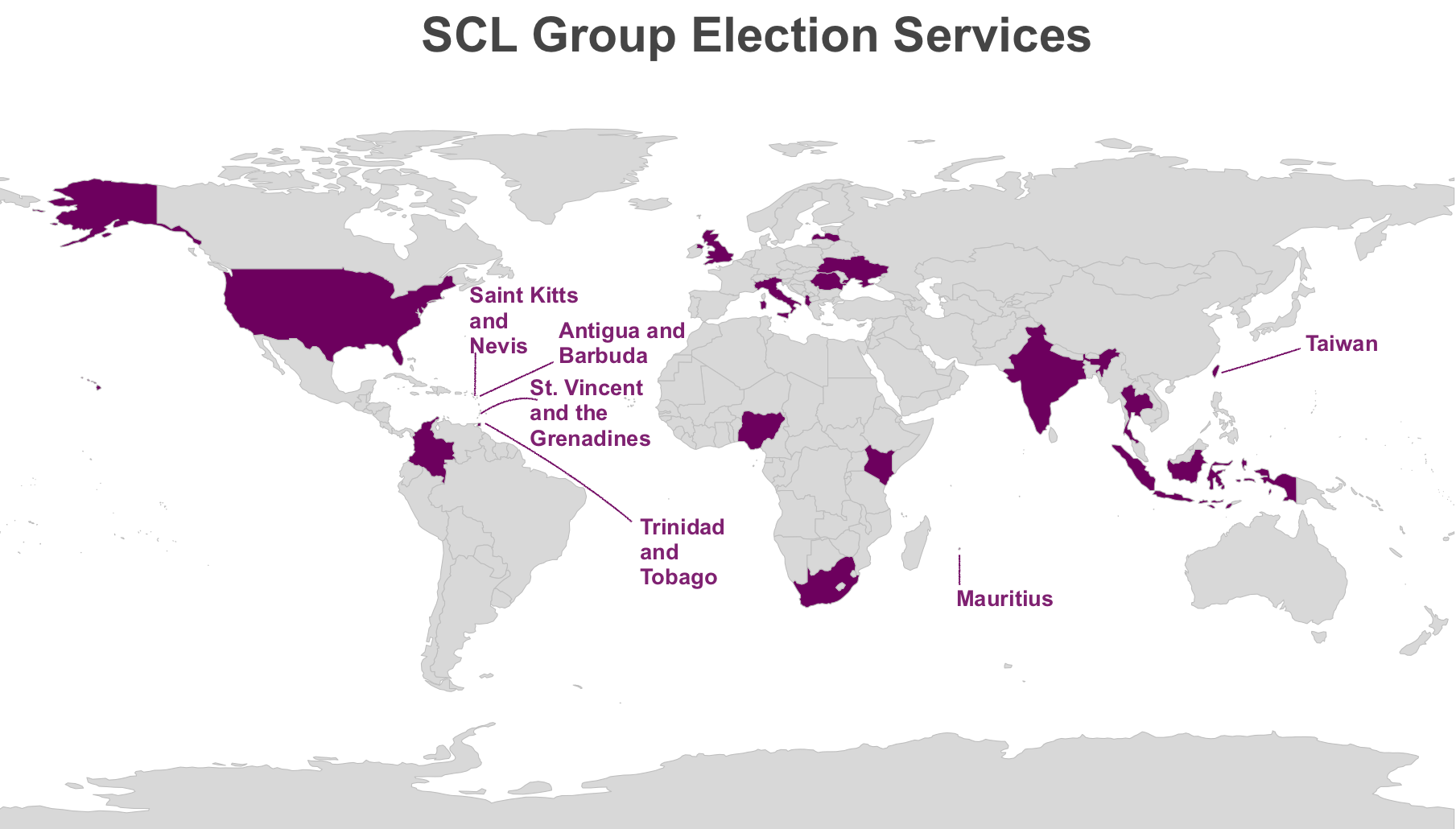
Is it new?
While the use of psychometric profiling in combination with large volumes of data and machine learning is new, the foundational idea of using psychology for influence is not. The origins of the OCEAN model can be traced back to the late 19th century with the first documented attempts to classify human personality. A few decades later, Edwards Bernays became famous for his ideas built upon this psychological research. Hailed today as the father of public relations, Bernays was the first person to put into business and political practice the ideas propounded by his uncle, Sigmund Freud. In 1929, Bernays worked with tobacco companies to induce women to purchase cigarettes under the guise of gender equality. He also helped frame Guatemala as a communist threat to the US in order to increase support for the Cold War, ultimately leading to an overthrow of the Guatemalan government in 1954. He later referred to the scheme as "the engineering of consent."
In 1928, he published Propaganda, a work combining insights from psychology and communication in the context of mass manipulation. He wrote in the opening:
"The conscious and intelligent manipulation of the organised habits and opinions of the masses is an important element in democratic society. Those who manipulate this unseen mechanism of society constitute an invisible government which is the true ruling power of our country."
Bernays's ideas are ingrained in the design and infrastructure of advertising, and psychometric profiling continues a tradition of deploying personal information in the service of a desired outcome. In the 1960s, Lester Wunderman, a marketing executive who coined the term "direct marketing," argued that there are two ways to sell anything — either via mass marketing or personalised advertising. While mass marketing advertises the same goods to a large market with one message, personalised advertising identifies a person's needs and addresses those needs at the right moment. Psychometrically-informed ads are simply an extension of this logic.
These dynamics have intensified with the advent of the internet, which allows for large-scale data collection, surveillance, profiling and targeting. Cambridge Analytica is not the only organisation involved.1 A number of other companies, both established and new – IBM, Nielsen, Affectiva, RealEyes, and Sensum, for starters – hope to profit from the heightened demand for psychometric profiling services.2
As Yasha Levine argues in his book, Surveillance Valley: The Secret Military History of the Internet:
"The use of manipulative, psychologically driven advertising and marketing techniques to sell us products, lifestyles, and ideas has been the foundation of modern American society [...] It oozes out of every pore on our body politic. It’s what holds our ailing consumer society together. And when it comes to marketing candidates and political messages, using data to influence people and shape their decisions has been the holy grail of the computer age, going back half a century."
Why should we care?
As the Cambridge Analytica revelations have made clear, psychometric profiling can be an instrument of larger agendas of political influence by swaying voters with targeted messages. The practice also introduces risks to privacy – particularly when the process is not transparent. In many cases, individuals may be profiled without their knowledge or consent and may have no recourse to avert the influence these profiles might have on how they politically engage.
In the context of elections, campaigns can also harness psychographic data towards less savoury ends, like voter suppression, and even more opaque forms of influence that are difficult for voters to discern or understand. Indeed, the advertising-centric, data-driven business model of the tech industry has realised its highest-stakes market: the market for ideas. As Alexander Nix, alluding to SCL's government-contracted work, stated:
"Persuading somebody to vote in a certain way is really very similar to persuading a 14- to 25-year-old boy in Indonesia to not join Al Qaeda."
Interestingly, after taking credit for Donald Trump's victory in November 2016, Cambridge Analytica has downplayed its use of psychometric methods, even claiming that such methods were never used.
Today, it is not Bernays or tobacco companies attempting to leverage psychology for persuasion but the likes of Experian, IBM and other companies leveraging data from the internet to sway the political process. As studies of psychometric profiling continue, efforts to enhance its influence likely will, too.
Varoon Bashyakarla is a data scientist and researcher at the Tactical Technology Collective. His past statistical undertakings led him to a variety of domains: public health, public safety, sports, finance, and cybersecurity. After working as a data scientist in Silicon Valley, he is now living in Berlin and exploring how personal information is used for political influence.
1 SCL was started in 1993 by Nigel Oakes, an advertising specialist who "argued that traditional advertising was incapable of effecting the type of mass opinion shifts necessary for social change." He then launched an offshoot, Behavioral Dynamics Institute, focused on group dynamics and decision-making, before repackaging SCL as a "psychological warfare" specialist.↩
2 You can interactively preview IBM's own psychometric services. IBM Watson's Personality Insights promises to "gain insight into how and why people think, act, and feel the way they do" by conducting natural language processing on text. An analysis of the Pope's personality based on his Twitter feed concludes that he is genial and empathetic, unlikely to have a gym membership, and unlikely to prefer style when buying clothes. Perhaps the Pope would beg to differ.↩
A special thank you to Christy Lange for her thoughtful feedback in editing this piece. Thank you to Amber Macintyre for her feedback and questions in drafting the psychometric profiling schematic. Thanks as well to Stephanie Hankey, Laura Ranca, and Gary Wright.
Published May 18, 2018. A different version of this piece entitled 'Psychometric Profiling: An Explanation and History' was published on April 4, 2018. For the original text, please contact the author.
Gwajin A/B: Gwaje-gwaje wajen tura sakonnin yakin neman zabe
التلفزيون الموجه: من يشاهد ما تشاهده؟
Akwatin Talabijin mai jin magana: Wa ke kallon abinda kake kallo?
Keta hurumi, Fallasa, da Kutse: Yadda rayuwar bayanan mai zabe ke cikin hadari
Manhajojin jirgin yakin neman zabe: Danna ka yi musharaka
អេបយុទ្ធនាការឃោសនា៖ ចុចដើម្បីចូលរួម
بيانات المستهلكين: وقود الحملات الرقمية
Bayanan mutane: Makamashin wutar yakin neman zabe a kafafen zamani
Dados Pessoais: Persuasão Política. Dentro da Indústria da Influência. Como funciona.
Datos Personales: Persuasión Política. Cómo funciona la Industria de la Influencia desde Adentro.
Sauraron bayanai a kafafen zamani: Daga dandalin sada zumunta
الاستهداف الجغرافي: القيمة السياسية لأماكن وجودك
Isa ga mutum ta inda yake: Amfanin wuraren da kake zuwa don manufar siyasa
البيانات الشخصية: عملية الإقناع السياسي
Bayanan mutane: Amfani da su wajen janyo ra’ayin siyasar mutane
Личные данные: политические убеждения. Внутри индустрии влияния
Особисті дані: політичне переконання. Всередині галузі впливу
التصنيف النفسي: الإقناع حسب الشخصية
Amfani da ayyukan mutum wajen kiyasin dabi’arsa: Janyo hankalin mutum ta dabi’arsa
Kiran wayan da tura sakonnin mutum-mutumi: Yakin neman zaben ta na’urar yi da kanka
تأثير نتائج البحث: الوصول إلى الناخبين الباحثين عن إجابات
Tasiri wajen amsoshi yayinda kake bincike: Isa ga masu kada kuri’a a zabe masu tambayoyi
Bibiya daga wani na-gefe: Kukis, Bikons, zanen yatsu da sauransu
Fasahohi masu tasowa: Abubuwan da zasu jagoranci fasahar yakin neman zabe
Kundin masu zabe: Bayanan siyasa a game da kai
ទិន្នន័យផ្ទាល់ខ្លួន៖ ការបញ្ចុះបញ្ចូលផ្នែកនយោបាយ ឥទ្ធិពល និងដំណើរការនៅក្នុងឧស្សាហកម្មនេះ មានជាភាសាខ្មែរ
Now Translated - Personal Data: Political Persuasion. Inside the Influence Industry
Tools of the Influence Industry
ទិន្នន័យអ្នកប្រើប្រាស់៖ ការបង្កើតឲ្យមានយុទ្ធនាការឃោសនាតាមបែបឌីជីថល
Dados de Consumidor: O combustível de campanhas digitais
Consumer Data: The fuel of digital campaigns
Datos de consumo: El combustible de las campañas digitales
سجلات الناخبين:بيانات سياسية عنك
Ficheros de votantes: Información política sobre ti
បញ្ជីអ្នកបោះឆ្នោត៖ ទិន្នន័យនយោបាយអំពីអ្នក
Arquivos de eleitores: dados políticos sobre você
Voter Files: Political data about you
خروقات وتسريبات واختراقات: حياة بيانات الناخبين المخترقة
Brechas, Filtraciones y Hackeos: La vulnerabilidad de los datos sobre votantes
ការរំលោភបំពាន, ការលេចធ្លាយ និង ការលួចយកទិន្នន័យ៖ ភាពប្រឈមនឹងគ្រោះថ្នាក់នៃទិន្នន័យរបស់អ្នកបោះឆ្នោត
Violações, Vazamentos e Hacks: A vida vulnerável dos dados dos eleitores.
Breaches, Leaks and Hacks: The vulnerable life of voter data
اختبار أ/ب: تجارب على رسائل الحملات
Pruebas A/B: Experimentar con mensajes de campaña
ការធ្វើតេស្ត A/B៖ ពិសោធន៍ក្នុងយុទ្ធនាការផ្ញើសារ
Testes A/B: Experimentos em mensagens de campanha
A/B Testing: Experiments in campaign messaging
تطبيقات الحملات: انقر للمشاركة
Apps de Campañas: Pulsa aquí para participar
Aplicativos de Campanha: Toque para participar
Campaign Apps: Tap to Participate
تقنيات الطرف الثالث للتتبع: ملفات تعريف الارتباط وأجهزة الإرشاد وبصمات المتصفح وغيرها
Rastreo de terceros: cookies, balizas, huellas y más
ការតាមដានពីភាគីទីបី៖ ឃុគឃី, ប៊ីខិន, ការស្គេនស្នាមក្រយ៉ៅដៃ និងវិធីសាស្ត្រជាច្រើនផ្សេងទៀត
Rastreamento de terceiros: cookies, beacons, impressões digitais e muito mais
Third-Party Tracking: Cookies, beacons, fingerprints and more
الاستماع الرقمي: الاطلاع على شبكات التواصل الاجتماعي
Escucha Digital: Perspectivas sobre las plataformas de redes sociales
ការស្តាប់តាមឌីជីថល៖ គំនិតដកស្រង់ចេញពីបណ្តាញសង្គម
Escuta Digital: Informações das Redes Socias
Digital Listening: Insights from social media
Geo-targeting: el valor político de tu ubicación
ការកំនត់គោលដៅទីតាំងភូមិសាស្រ្ត៖ គុណតម្លៃផ្នែកនយោបាយនៃទីតាំងរបស់អ្នក
Direcionamento por Geolocalização: O valor político da sua localização.
Geotargeting: The Political Value of Your Location
La influencia de los resultados de búsqueda: acceder a votantes en busca de respuestas
ឥទ្ធិពលតាមរយៈលទ្ធផលនៃការស្វែងរក៖ ឆ្ពោះទៅដល់អ្នកបោះឆ្នោត ដើម្បីស្វែងរកចម្លើយ
Influência do resultado de buscas: Alcançar eleitores que procuram respostas
Search Result Influence: Reaching voters seeking answers
Televisión Dirigida: ¿Quién está viendo lo que ves?
ទូរទស្សន៍ដែលអាចប្រាស្រ័យបាន (Addressable TV)៖ នរណាកំពុងមើលនូវអ្វីដែលអ្នកកំពុងមើល?
TV Endereçável: Seus Hábitos de Visualização como Ativos Políticos
Addressable TV: Your Viewing Habits as Political Assets
المكالمات الهاتفية الآلية ورسائل المحمول النصية: الحملات الدعائية المميكنة
Llamadas Automáticas y Mensajes Celulares: Difusión de campaña automatizada
ទូរស័ព្ទស្វ័យប្រវត្តិ និងការផ្ញើរសារតាមទូរស័ព្ទ៖ ការធ្វើយុទ្ធនាការផ្សព្វផ្សាយដោយស្វ័យប្រវត្តិ
Telefonemas Automáticos e Mensagens Celulares: Divulgação automatizada de campanha
Robocalls and Mobile Texting: Automated campaign outreach
WhatsApp: The Widespread Use of WhatsApp in Political Campaigning in the Global South
Perfiles Psicométricos: Persuasión basada en personalidades
ទម្រង់ចិត្តវិមាត្រ៖ ការបញ្ចុះបញ្ចូលតាមរយៈបុគ្គលិកលក្ខណៈ
Perfil Psicométrico: Persuasão pela Personalidade nas Eleições
التقنيات المستقبلية: آفاق جديدة في تكنولوجيا الحملات
Tecnologías Emergentes: La próxima frontera en las tecnologías de campaña
បច្ចេកវិទ្យានៅថ្ងៃអនាគត៖ វិធីសាស្ត្រនាពេលអនាគតក្នុងបច្ចេកវិទ្យាយុទ្ធនាការឃោសនា
Tecnologias Futuras: A Próxima Fronteira nas Tecnologias de Campanha
Upcoming Technologies: The next frontier in campaign technology
Behavioral Data in Elections: Video